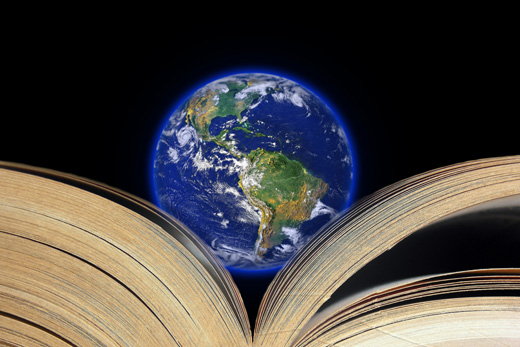Goethe’s crowning work, "Faust," is heralded for its ambivalent look at modern times and man’s power to dominate and alter the physical landscape.
In James Dickey’s novel (and later film), "Deliverance," romantic notions of man’s ability to enjoy and tame the wilderness were turned on their heads.
In both the English and German Studies departments, Emory College is at the forefront of an emerging field that examines those disparate works and others, in a bid to answer what the humanities can offer to further understanding of the world’s unfolding environmental crisis.
"We are looking at the literature from a new point of view," says Caroline Schaumann, a German Studies associate professor who has become a leader in ecocriticism, a study of the environment and literature that has gained traction in the wake of climate change.
"I think it’s very important to look at climate change and the other environmental concerns as they are depicted in the literature because all the science depends on how it is portrayed to the public," Schaumann explains.
The German-speaking tradition has a deep history of thinkers concerned about the environment. Alexander von Humboldt, for instance, was one of the most celebrated naturalists and scientific thinkers of the 19th century who already realized that humans could cause climate change by actions such as deforestation. And Ernst Haeckel coined the word "ecology" in the middle of the 19th century, Schaumann says.
That thinking bled over into German-language works, from poems to plays to novels. While classical examinations would look at nature in those works as a symbol or metaphor that mirrored human concerns, ecocriticism, in contrast, attempts to delineate how people relate to the environment and are in turn shaped by it. From that lens, "Faust" is about both man’s hubris in trying to tame nature and the land’s destruction, as well as the price he pays for this hubris.
"Historically, literature’s been about how we exist and live and work with and against nature," Chebon Ryan, a sophomore majoring in German Studies and business administration, says of his study in Schaumann’s class.
"Ecocriticism lets us acknowledge we’ve changed our environment and discuss our accountability to that," Ryan adds.
'Understanding the broader picture'
Ecocriticism is, by nature, an interdisciplinary exercise. Cultural works engage environmental history, sociology and natural sciences in Emory’s English department as well.
Professor Barbara Ladd’s "Southern Literature and Ecocriticism" course focuses heavily on ideas of nature and wilderness in texts, not as characters but as concepts.
In "Deliverance," then, the question becomes what the story — of city dwellers viewing a soon-to-be-dammed river as their playground who get attacked by locals whose homesteads are threatened by the project — has to say about environmental discourse.
"They are taking land locals have lived on for generations to build the reservoir," Ladd says. "Ecocriticism can deal with that refining literary attention to interpretation. They are learning that their dreams and ideals about a life close to nature are much more complicated than thought."
The ideas that govern human interaction with the environment, then, move to the forefront of discussion.
Schaumann says that can be as simple as understanding the landscape as something that cannot be separated from the characters.
That leads to more complex thinking, such as challenging the ideas of man-made life versus natural life. Breaking down that distinction shows climate change as man-made yet very much of nature, she says.
"The old categories don’t apply anymore," says Schaumann, who will lead aroundtable discussionon April 13 about ecocriticism.
Schaumann, who is co-editing a book due later this year or early next on the field, hopes that understanding will inform students in other pursuits.
It already has for junior Chloe Kipka. The German Studies and classical civilization major has applied what she’s learning in Schaumann’s course to a philosophy class assignment on the environment and ethics.
"The important part of any liberal arts education is understanding the broader picture," Kipka says. "I knew nothing about ecocriticism, and now knowing it, I’m engaged in the environmental debate."

